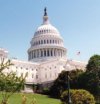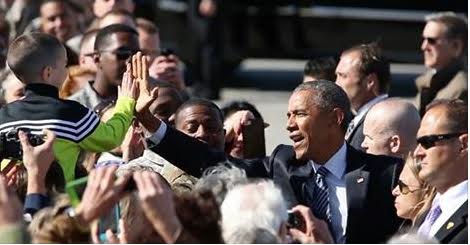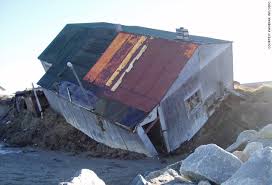|
|
|
|
|
|
|
|
 Today's Congressional Action: Today's Congressional Action:
The House and Senate are not in session.
|
 Obama to Announce New Climate Effort for Alaska. President Obama will announce a series of programs to help Alaskan communities impacted by climate change during his trip to the Arctic Circle on Wednesday. Obama will travel to the Alaskan town of Kotzebue on the third day of his trip the state. While there, he will detail a handful of administrative actions to help rural communities cope with climate change, the White House said. Obama will announce that he's directing a federal and local board called the Denali Commission to oversee climate change mitigation efforts in the state. The Hill Obama to Announce New Climate Effort for Alaska. President Obama will announce a series of programs to help Alaskan communities impacted by climate change during his trip to the Arctic Circle on Wednesday. Obama will travel to the Alaskan town of Kotzebue on the third day of his trip the state. While there, he will detail a handful of administrative actions to help rural communities cope with climate change, the White House said. Obama will announce that he's directing a federal and local board called the Denali Commission to oversee climate change mitigation efforts in the state. The Hill
US, Russia United in Desire to Protect Arctic Ocean From Unregulated Fishing. As geopolitical tensions between the United States and Russia have risen, there is at least one subject about which relations are warm -- the mutual desire to protect the Arctic Ocean from unregulated exploitation by vessels chasing northward-moving fish. The two nations, along with Canada, Norway and Greenland/Denmark, pledged in July to keep their commercial fishermen out of the 1.1 million square miles of international waters in the central Arctic Ocean, at least for the foreseeable future. Alaska Dispatch News
Nunavut Mayor Says Seismic Impact Research is Welcome to Inuit. The mayor of Clyde River says some of what he's been reading in a recent Greenpeace-commissioned report on seismic blasting and other human-made impacts on whales reflects what Inuit have been observing for years. And Jerry Natanine said Aug. 27 he wishes the people who held community information sessions on behalf of seismic companies back in 2011 could have presented these kinds of facts so Inuit could have felt better informed on the subject. "It gives us answers. It gives us an ability to judge whether we can live with this," said Natanine. Nunatsiaq Online
 Washed Away: Obama's Arctic Visit Buoys Climate Refugees. Not so very long ago, the elders of Shishmaref, Alaska, warned the younger generation that cataclysmic change was coming to their tiny village on a barrier island perched just above the Bering Strait, where families still survive on seal meat and caribou soup. "The elders that passed away used to say that someday we'll have no winter. It's happening now," said Jimmy Seetomona, 48, one of about 600 people who live in the village just 20 miles south of the Arctic Circle. "I've noticed a lot of changes in my time," Seetomona added, surveying a coastline that has been shrinking as much as 20 feet a year. "There were a lot of homes here a few years ago." NBC News Washed Away: Obama's Arctic Visit Buoys Climate Refugees. Not so very long ago, the elders of Shishmaref, Alaska, warned the younger generation that cataclysmic change was coming to their tiny village on a barrier island perched just above the Bering Strait, where families still survive on seal meat and caribou soup. "The elders that passed away used to say that someday we'll have no winter. It's happening now," said Jimmy Seetomona, 48, one of about 600 people who live in the village just 20 miles south of the Arctic Circle. "I've noticed a lot of changes in my time," Seetomona added, surveying a coastline that has been shrinking as much as 20 feet a year. "There were a lot of homes here a few years ago." NBC News
Death of Knut the Polar Bear is Explained at Last. Scientists have solved the zoological mystery of what killed Knut, the Berlin Zoo's famous polar bear, more than four years after he drowned in his enclosure as horrified visitors watched.
The 4-year-old bear had an autoimmune disease that attacks the brain, according to a study published Thursday in Scientific Reports, a research journal. It is unusual that Knut had the disease at all. Known as anti-NMDA receptor encephalitis, the disease was discovered relatively recently and was thought to affect only humans. The findings raise awareness and open up the possibilities of further veterinary research into an illness that is treatable. New York Times
In Alaska, Obama Will be in Middle of Oil and Climate Change Battle. Gov. Bill Walker ticks down the things he wants President Obama to see in visiting this vast northern state starting on Monday, and glorious glacial vistas are not at the top of the list. He would like Mr. Obama to see the people lining up for services at state agencies that have been crippled by billions of dollars in state budget cuts as oil revenues have collapsed. Mr. Walker points out that law enforcement, education and transportation - all crucial in a state with roadless areas larger than Texas - were all severely hit as a fifth of the state budget got redlined out earlier this year, and billions more in cuts loom for next year. New York Times
 [Opinion] The US Icebreaker Gap is About Arctic Needs, Not About Chasing Russia. Way back in the Cold War, the United States fixated on a "missile gap" with the Soviet Union. You may remember this even devolved into a "mineshaft gap" in "Dr. Strangelove." These days, you're hearing more about an "icebreaker gap" facing the United States. This is almost always cast (see Politico) as an ominous comparison to Russia's enormous, and growing, icebreaker fleet. There's a strong implication that this is a strategic competition. The real American icebreaker gap is simply between this country's icebreaking needs and its capacities - which are minimal and deteriorating, as the National Academy of Sciences and others have long warned. New York Times [Opinion] The US Icebreaker Gap is About Arctic Needs, Not About Chasing Russia. Way back in the Cold War, the United States fixated on a "missile gap" with the Soviet Union. You may remember this even devolved into a "mineshaft gap" in "Dr. Strangelove." These days, you're hearing more about an "icebreaker gap" facing the United States. This is almost always cast (see Politico) as an ominous comparison to Russia's enormous, and growing, icebreaker fleet. There's a strong implication that this is a strategic competition. The real American icebreaker gap is simply between this country's icebreaking needs and its capacities - which are minimal and deteriorating, as the National Academy of Sciences and others have long warned. New York Times
Russia to Boost Scientific Research in Arctic, Antarctic. Russia is planning to increase the annual number of scientific expeditions in the Arctic region to 100 by 2031, the country's Minister of Natural Resources and Environment Sergei Donskoi said Wednesday. "We are planning to increase the Russian scientific presence in the Arctic region: about 100 comprehensive expeditions will be conducted annually by 2031 under optimal conditions," Donskoi told RIA Novosti. Sputnik News
Arctic Study Finds CO2 Helps Plants Grow But Only at Low Temperatures. A new international study involving researchers from The University of Western Australia has found that carbon dioxide (CO2) has a positive effect on producing organic material at low temperatures in the Arctic Ocean, but that this effect disappears once temperatures increase. The research, published in Nature Climate Change, is expected to help improve predictions about the future impact of climate change. Phytoplankton are the first link in the food chain and are known as primary producers because they produce the first forms of food. Phys.Org
Obama Visits Arctic Communities to Discuss Native Issues. President Barack Obama on Wednesday will become the first sitting U.S. president to visit a community north of the Arctic Circle, a trek the White House hopes will bring into focus how climate change is affecting Americans. After meeting tribal leaders and fishermen in Dillingham, home to the world's largest sockeye salmon fishery, Obama will fly into Kotzebue, an Arctic town of about 3,000 that is battling coastal erosion caused by rising seas. Reuters
|
|
Legislative Action
No Arctic legislation was formally considered yesterday.
|
|
Future Events
11th Conference on Hunting and Gathering Societies (CHAGS XI), September 7-11 (Vienna, Austria). The study of hunter-gatherer societies has become, since the landmark conference "Man and Hunter" in 1966, a major topic of study within the social and human sciences community. While scholarly foci have changed during the last 50 years, the principle goal generated during the initial conference, to establish a unified field of hunter-gatherer studies, is as valid today as it was then. CHAGS XI hopes to explore how research results since 1966 and new research agendas can be applied for present and future study.
Eighth Polar Law Symposium Alaska 2015, September 23-26, 2015 (Fairbanks and Anchorage, Alaska , USA). The Eighth Polar Law Symposium is co-hosted by Alaska Pacific University (APU), the University of Alaska Fairbanks, the University of Alaska Anchorage (through its Justice Center and its Institute of Social and Economic Research), the University of Washington School of Law, and Vermont Law School, in cooperation with the Arctic Law Section of the Alaska Bar Association. The symposium will be held on both campuses of the University of Alaska. The 2015 theme is: The Science, Scholarship, and Practice of Polar Law: Strengthening Arctic Peoples and Places.
2015 Arctic Energy Summit, September 28-30, 2015 (Fairbanks, Alaska, USA). The Institute of the North's 2015 Arctic Energy Summit builds on our legacy efforts to address energy as a fundamental element of the sustainable development of the Arctic as a lasting frontier.Central to this concept is a focus on providing pathways for affordable energy development in the Arctic and for Arctic communities.
The Arctic Circle is the largest global gathering on the Arctic. It is attended by heads of state and governments, ministers, members of parliament, officials, experts, scientists, entrepreneurs, business leaders, indigenous representatives, environmentalists, students, activists, and others from the growing international community of partners and participants interested in the future of the Arctic. The Arctic Circle highlights issues and concerns, programs, policies and projects; it provides platforms for dynamic dialogue and constructive cooperation. While the plenary sessions are the responsibility of the Arctic Circle, the breakout sessions are organized by various participating partners in their own name and with full authority over the agenda and the choice of speakers.
2015 Arctic Science Conference, October 1-3, 2015 (Anchorage, Alaska, USA). The conference theme is "Healthy Estuaries: Sustainability and Resilience." Conference topics include traditional scientific disciplines, science education, arctic social sciences, biomedical research, and artistic interpretation of the evolving North. Abstract submissions are now being accepted. The deadline is August 1, 2015.
The Polar Oceans and Global Climate Change, November 3-6, 2015 (La Jolla, California USA). The American Polar Society will host this Symposium at Scripps Institution of Oceanography. A flyer with a partial list of presenters is available on the Society's website (americanpolar.org) and from the Society's Membership Chairman by email.
Forum for Arctic Modeling and Observational Synthesis Meeting, November 3-6, 2015 (Cape Cod, MA, USA). On November 3rd, the 2015 School for young scientists will consider "Regional Oceanography of the Arctic marginal seas" with lectures covering major features of atmospheric, sea ice and oceanographic regimes of the: Bering, Chukchi, Beaufort, East-Siberian, Laptev Sea, Kara, Barents and Nordic seas. On November 4-6, the meeting portion will summarize project accomplishments for the last 3 years of activities and will focus on the formulation of scientific questions and directions for FAMOS future research (2016-2019) to: (a) improve Arctic modeling, employing very high resolution models; (b) develop and test new arctic monitoring/observing systems and (c) improve predictions of Arctic environmental parameters with reduced uncertainties.
Due North: Next Generation Arctic Research & Leadership, November 5-8, 2015 (Calgary, Alberta, Canada). The Association of Canadian Universities for Northern Studies (ACUNS) will convene an interdisciplinary conference of early career scientists working on Arctic issues. Topics will include: Arctic Communities, Arctic Sustainable Development, Arctic Wildlife, Ecosystem and Biodiversity, Arctic Food Security, Arctic Landscapes, Climate Change and Adaptation, Disaster Risk Management, Policy, Politics and Leadership, Arctic Environment (Data and Techniques), Arctic Resources, and Future of Arctic.
Arctic Observing Open Science Meeting, November 17-19, 2015 (Seattle, Washington). The Arctic Observing Open Science Meeting will be 2.5 days and held at the Hyatt at Olive 8 in Seattle, Washington. The conference will bring together individuals and teams involved in the collection, processing, analysis, and use of observations in the Arctic - from academia, agencies, industry, and other organizations. The meeting will be convened as a combination of plenary talks, parallel science sessions, and a poster session. The agenda and registration information will be forthcoming.
In the Spirit of the Rovaniemi Process 2015, November 24-26, 2015 (Rovaniemi, Lapland, Finland).When the Arctic Environmental Protection Strategy, the so-called Rovaniemi Process, was adopted in 1991, it aimed at overcoming divisions and turning the zone of Cold War military tensions into a region of peace and co-operation. In this joint effort focusing on the protection of environment, and later, sustainable development, the Arctic states supported by indigenous organizations laid grounds for institutionalized collaboration and the emergence of Arctic regional identity. The second international conference will bring together decision-makers, scholars, artists, designers and students to address these questions and discuss the Arctic in global, regional and local perspectives.
|
|

  
4350 N. Fairfax Drive, Suite 510
Arlington, VA 22203, USA
External links in this publication, and on the USARC's World Wide Web site ( www.arctic.gov) do not constitute endorsement by the US Arctic Research Commission of external Web sites or the information, products or services contained therein. For other than authorized activities, the USARC does not exercise any editorial control over the information you may find at these locations. These links are provided consistent with the stated purpose of this newsletter and the USARC Web site.
|
|
|
|
|
|
|
|
|